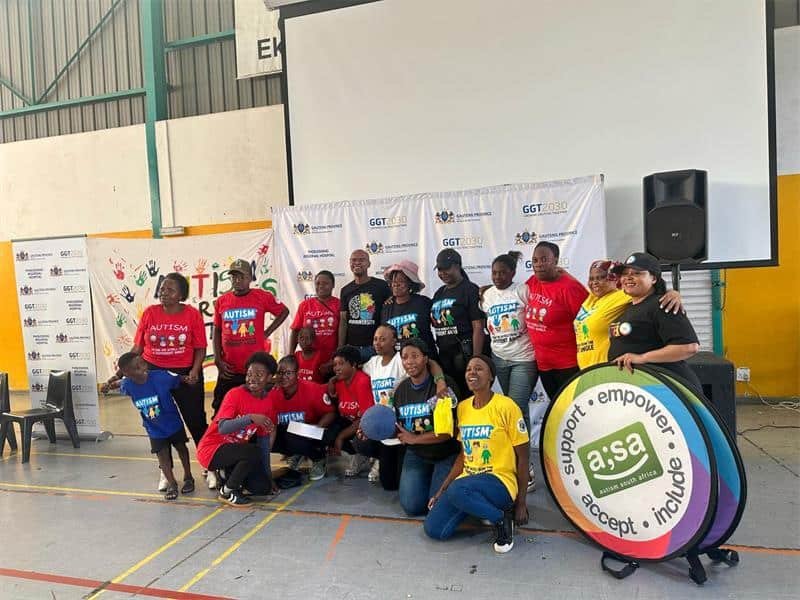
Tsakani – Pholosong Regional Hospital’s physiology department marked its fourth annual Autism Awareness Month at the Faranani Multipurpose Centre on April 10.
The aim was to teach the public about neurodevelopmental disorders, challenge stigma and connect families with support services. The event received support and sponsorship from Kwa-Thema Ward 86 Clr Nkgopotse Mekgwa.
Autism spectrum disorder (ASD) is a complex developmental condition involving persistent challenges with social communication, restricted interests and repetitive behaviour.
According to the head of the psychology department, Dr Lerato Motsoaledi, neurodevelopmental disorders like ASD, Attention-deficit/hyperactivity disorder (ADHD), and intellectual disability disorders have been neglected for many years and are often misunderstood.
“Children living with those conditions have also been neglected. We must raise awareness and offer public resources and information about the conditions. It is even more important to advise the public on where to seek help when needed,” explained Motsoaledi.
Motsoaledi explained that their event challenges the stigma around these disorders, and they seek to build champions and advocates who will speak and raise awareness based on neurodevelopmental disorders.
“It is beautiful to witness how most parents have turned to educate the public about the disorders their children face. They have become their children’s advocates,” she said.
As advice, Motsoaledi urged parents to visit hospitals or seek professional help from psychologists when assuming their child has a disorder.
“There is a lot of information on the internet, accurate and inaccurate, so relying on that information for a diagnosis is not a good idea. It can be problematic. It is important to get advice from a professional to determine the severity and level of the disorder,” she added.
Beadwork from the Mashidiso LSEN School learners.
She described ASD as a condition that causes difficulties in social communication, social reciprocity, understanding how to behave in a social setting, and forming and maintaining relationships.
“They find it difficult to maintain eye contact. They struggle with things we take for granted and regard as normal social behaviours,” added Motsoaledi.
The event received support from individuals, school representatives and organisations, including Autism South Africa, which offers services and assistance to autistic individuals, their families, and caregivers.
“We offer tutoring and support tailored to children with autism and related disorders. We also provide free specialist support and therapeutic services for autistic individuals, their families and carers.
Mashudu Mphohoni and Nompumelelo Matiso.
“Autism SA aspires to achieve a society in which autistic people enjoy all rights and opportunities to meet their needs and fulfil their potential throughout their lives as loved and valued members of their families and communities,” said Elizabeth Mosehla, the Gauteng regional development officer.
Mosehla is also a sister to an autistic young man and said her family did not understand her brother while he was growing up. She described his childhood as full of misconceptions and criticism.
“No one had an explanation for his condition. My mother had to quit her job to take care of my brother. The neighbours labelled him differently and called him names.
“We could not participate in social or family gatherings because no one understood my brother. It frustrated him because he could not communicate with us, and we did not know how to communicate with him.
ALSO CHECK: Local community celebrates 108th birthday of beloved elder with heartfelt ceremony
“Over the years, I got to understand his disorder and educated my family about it. We have learnt to understand him. We can better communicate with him now and make him feel at ease,” Mosehla said.
SASSA was among the organisations present. Their representatives answered the public’s questions and provided clarity on questions about the care dependency grant given to children under 18.
SASSA Tsakani office supervisor Duduzile Sikhosana said that whoever qualifies for the grant must be a child with a disability that warrants permanent care from a parent or caregiver.
“When a parent applies for this grant, we look at their income through a means test to determine if they qualify.”
Required documents for the application:• Parent(s) ID and marriage certificate if married;• Payslip;• Three months of bank statements.
“Community members can access disability and care dependency grant forms on the SASSA website. Individuals and children are subjected to a medical assessment by a SASSA-based doctor to receive the grant. Appointments for the assessment are booked online,” she explained.
Sikhosana said the grant application could be approved or disapproved for various reasons.
Parents receive information.
Stakeholder representatives and the Pholosong Regional Hospital staff.
The Pholosong Reginal Hospital physiology department and Clr Nkgopotse Mekgwa.
At Caxton, we employ humans to generate daily fresh news, not AI intervention. Happy reading!
Stay in the know. Download the Caxton Local News Network App here.